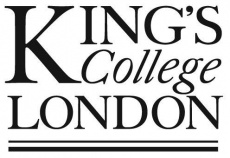Difference between revisions of "Teaching About Terrorism: King's College London"
| Line 7: | Line 7: | ||
[[King's College]] also houses a terrorism research institute called the [[International Centre for the Study of Radicalisation and Political Violence]]. The Centre claims expertise on 'radicalisation' and is a collaboration between King's College, the University of Pennsylvania in the United States, the [[Interdisciplinary Center Herzliya]] in Israel and the [[Regional Center on Conflict Prevention]] in Jordan. It is headed by the [[King's College London|King's College]] terrorism expert [[Peter Neumann]]. | [[King's College]] also houses a terrorism research institute called the [[International Centre for the Study of Radicalisation and Political Violence]]. The Centre claims expertise on 'radicalisation' and is a collaboration between King's College, the University of Pennsylvania in the United States, the [[Interdisciplinary Center Herzliya]] in Israel and the [[Regional Center on Conflict Prevention]] in Jordan. It is headed by the [[King's College London|King's College]] terrorism expert [[Peter Neumann]]. | ||
| + | |||
| + | ISCR's was launched at a conference in London which it called the '[[First International Conference on Radicalisation and Political Violence]]'. On the morning of the first day of the conference the then UK Home Secretary [[Jacqui Smith]] gave a speech launching the government's new anti-terror intiative. <ref>Tom Patterson, ''The Journal'' (Newcastle),17 January 2008; p.2</ref> Speaking to the [[BBC|BBC's]] Radio 4 ''Today'' programme before her speech, Smith said there were specific examples of websites that 'clearly fall under the category of gratifying terrorism" and that, "There is growing evidence people may be using the internet both to spread messages and to plan specifically for terrorism.' <ref>quoted in Hélène Mulholland, '[http://www.guardian.co.uk/politics/2008/jan/17/uksecurity.terrorism Government targets extremist websites]', guardian.co.uk, 17 January 2008</ref> The government's new intiative coincided with ISCR's first major research 'Countering Online Radicalisation', and no doubt ISCR's launch and the launch of the government's new terrorism initiative were deliberately timed. | ||
==Teaching About Terrorism Resources== | ==Teaching About Terrorism Resources== | ||
Revision as of 16:20, 2 August 2010
Details of courses and modules
King's Department of War Studies teaches a Masters in Terrorism, Security & Society. The Course description on Prospects.ac.uk states:
This programme is interdisciplinary, involving history, political science, and international relations, as well as sociology and social psychology, risk studies, and even critical approaches. Depending upon the pathway chosen and the mix of options within each pathway, the focus of the degree will vary from a strong emphasis on security and counterterrorism issues through to a critical social science approach and analysis of societal response and adaptation.
King's College also houses a terrorism research institute called the International Centre for the Study of Radicalisation and Political Violence. The Centre claims expertise on 'radicalisation' and is a collaboration between King's College, the University of Pennsylvania in the United States, the Interdisciplinary Center Herzliya in Israel and the Regional Center on Conflict Prevention in Jordan. It is headed by the King's College terrorism expert Peter Neumann.
ISCR's was launched at a conference in London which it called the 'First International Conference on Radicalisation and Political Violence'. On the morning of the first day of the conference the then UK Home Secretary Jacqui Smith gave a speech launching the government's new anti-terror intiative. [1] Speaking to the BBC's Radio 4 Today programme before her speech, Smith said there were specific examples of websites that 'clearly fall under the category of gratifying terrorism" and that, "There is growing evidence people may be using the internet both to spread messages and to plan specifically for terrorism.' [2] The government's new intiative coincided with ISCR's first major research 'Countering Online Radicalisation', and no doubt ISCR's launch and the launch of the government's new terrorism initiative were deliberately timed.
Teaching About Terrorism Resources
Teaching Terrorism blog
Aberystwyth University
University of Nottingham
University College London
Notes
- ↑ Tom Patterson, The Journal (Newcastle),17 January 2008; p.2
- ↑ quoted in Hélène Mulholland, 'Government targets extremist websites', guardian.co.uk, 17 January 2008
